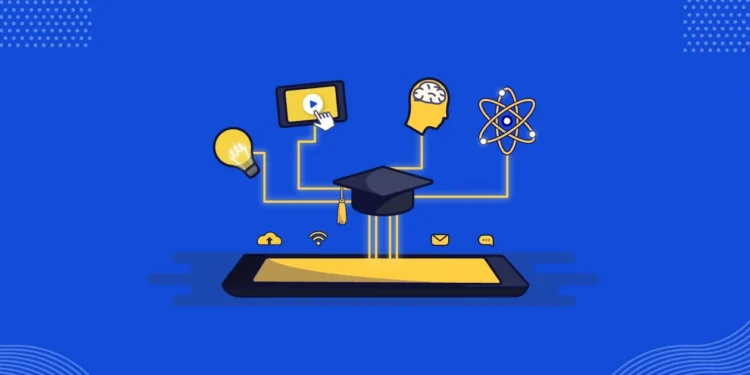In today’s rapidly evolving educational world, the integration of technology and education is unavoidable. This transformation is particularly evident in the professional development of educators, where EdTech (Educational Technology) is playing a significant role. The traditional model of professional development, often characterised by static workshops and generic seminars, is giving way to a dynamic and personalised approach, thanks to the innovative applications of EdTech.
This shift in the education sector is enabling educators to access resources, training modules, and collaborative platforms that take care of their specific needs and interests. It also fosters ongoing learning, allowing teachers to stay up-to-date with the latest pedagogical strategies, technological advancements, and research-based practices.
In this article, we will discuss the impact of EdTech on professional development for educators, we will also explore many ways in which it is reshaping teaching practices, enhancing student outcomes, and ultimately, revolutionising the field of education.
Benefits of EdTech in Professional Development

Access to High-Quality Resources
EdTech provides access to a vast range of high-quality resources, such as online courses, webinars, and virtual conferences. This allows educators to learn at their own pace, at a time and place that suits them.
Personalized Learning Experiences
EdTech can be used to create personalized learning experiences for educators, based on their individual needs and interests. For example, adaptive learning platforms can identify areas of strength and weakness and provide targeted resources to address specific needs.
Opportunities for Collaboration
EdTech can facilitate collaboration among educators, both locally and globally. For example, social media platforms can be used to share resources, discuss teaching strategies, and collaborate on projects.
Feedback and Assessment
EdTech can provide immediate feedback and assessment, allowing educators to monitor their progress and adjust their learning accordingly. For example, learning analytics can be used to track student progress and identify areas where further support is needed.
Challenges of EdTech in Professional Development
While EdTech offers many benefits for professional development, there are also challenges to its implementation that educators and institutions must grapple with. These challenges include:
Access and Infrastructure:
Not all educators have equal access to technology, and some may not have the necessary infrastructure to support online learning. This digital divide can increase inequalities in professional development opportunities.
Quality Control
The vast array of educational resources available through EdTech can be both a blessing and a curse. It can be challenging to ensure that the quality of content is reliable, accurate, and aligns with educational standards. Sorting through this abundance of resources can be time-consuming for educators.
Teacher Training
While EdTech tools can be powerful, educators may require training to use them effectively. This training can be time-consuming and costly, and not all teachers may have the necessary tech literacy to fully leverage these tools.
Privacy and Security
EdTech platforms often involve the collection and storage of sensitive data, including student records and personal information. Ensuring the privacy and security of this data is crucial, and lapses in security can have serious consequences.
Cost and Sustainability
Implementing and maintaining EdTech solutions can be expensive for educational institutions. Finding sustainable funding models for ongoing access to technology and resources can be a significant challenge.
Pedagogical Integration
Effectively integrating EdTech into the curriculum and pedagogical approaches can be a complex task. It requires aligning technology with educational goals and ensuring that it enhances, rather than detracts from, the learning experience.
Digital Literacy
Not only teachers but also students need to develop digital literacy skills to make the most of EdTech. Bridging the gap in digital skills and ensuring that both educators and learners are comfortable with technology is an ongoing challenge.
Equity and Inclusion
EdTech can inadvertently widen educational disparities if not implemented with care. Ensuring that technology benefits all students, regardless of their socio-economic background or abilities, requires careful planning and consideration.
Successful EdTech Initiatives in Professional Development
There are many successful EdTech initiatives that have transformed professional development for educators. For example:
EdCamp
EdCamp is an unconference model that provides educators with an opportunity to connect, share ideas, and collaborate. The model is entirely participant-driven, and educators have complete control over the agenda.
MOOCs
Massive Open Online Courses (MOOCs) provide educators with access to high-quality resources, often free of charge. MOOCs can be completed at a time and pace that suits the individual and can be used to gain new skills and knowledge.
Learning Management Systems (LMS)
LMS platforms provide educators with a single platform to manage their professional development. LMS platforms can be used to access resources, collaborate with peers, and monitor progress.
Ways EdTech is Transforming Professional Educator Development
Access to High-Quality Resources
With the abundance of online resources available, educators can access a variety of professional development opportunities without having to leave their classrooms. Online courses, webinars, and virtual conferences offer a flexible and convenient way for educators to engage with content and learn new skills.
Personalized Learning Experiences
EdTech tools and platforms are enabling personalized learning experiences for educators, allowing them to tailor their professional development to their specific needs and interests. Adaptive learning algorithms can suggest relevant content based on an educator’s interests and prior learning experiences.
Collaboration and Feedback
EdTech is providing opportunities for educators to collaborate and receive feedback from their peers and experts in the field. Social media platforms, online communities, and discussion forums allow educators to connect and share resources, ideas, and best practices.
Data-Driven Approaches
EdTech tools and platforms are enabling educators to collect and analyze data on their own learning and teaching practices. This data can inform decision-making and help educators identify areas for growth and improvement.
Cost-Effective Solutions
EdTech is providing cost-effective solutions for professional development, particularly for educators who work in underfunded schools or who have limited access to resources. Online courses and webinars can be less expensive than traditional professional development opportunities, and they can be accessed from anywhere.

Conclusion
EdTech has the potential to transform professional development for educators by providing access to high-quality resources, personalized learning experiences, and opportunities for collaboration and feedback.
While there are challenges to its implementation, the benefits are significant. By leveraging the power of technology, we can create a more accessible, efficient, and effective professional development system that supports the continuous learning and growth of educators.
As we continue to explore the potential of EdTech in professional development, it is essential to address the challenges and ensure that all educators have access to the resources they need to succeed. EdTech is transforming professional development for educators in numerous ways, from providing access to high-quality resources to creating personalized learning experiences and opportunities for collaboration and feedback.
While there are challenges to its implementation, the benefits are significant, and successful initiatives have shown the potential for EdTech to revolutionize the way we approach professional development.









